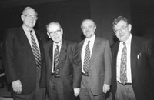Institute Professor Mario J. Molina described how, in an effort to cut down on the air pollution that plagues Mexico City, local officials enacted regulations that forced residents to leave their cars at home one day per week. Traffic congestion was eased. The plan seemed to be working.
Then officials realized that to circumvent the law, which was based on license plate numbers, people had started buying second cars, often even older and more polluting than their first.
Reality doesn't always pan out the way scientists would like it to, said Professor Molina, who described the project at the third Rosenblith Lecture in Science and Technology sponsored by the National Academy of Sciences on March 10 in Wong Auditorium. That's why an MIT project aimed at improving air quality in Mexico City is taking a multidisciplinary approach that involves several American institutions, Mexican academies and agencies and a handful of departments at MIT.
"We need not just expertise on chemistry or meteorology or pollution science," Professor Molina said. "We also need experts on mobility, land use and the health and economic aspects of the problem."
The topic of last week's Rosenblith lecture was atmospheric chemistry in the 21st century. The three scientists who shared the 1995 Nobel Prize for chemistry were reunited at the podium. In addition to Professor Molina, the speakers were Paul J. Crutzen, director of the atmospheric chemistry division of the Max Planck Institute of Chemistry in Germany; and F. Sherwood Rowland, the Donald Bren Research Professor of Chemistry and Earth System Science at the University of California at Irvine.
Professor Molina said the Mexico City project, conducted by the MIT Consortium on Environmental Challenges (CEC), is an initial case study. The researchers hope to develop an approach that will apply globally. The project, which will span several years and may take decades to see significant improvement, will provide a neutral discussion forum for decision makers.
"We [the scientists] have no political baggage," Professor Molina said. "This allows us to work closely with government officials to create new policy that integrates science and technology."
A PERSONAL CONNECTION
Professor Molina recalled that when he was a student in Mexico City many years ago, he was able to see the volcanoes that fringed the city "most days of the year. Now you're lucky to see them."
Mexico City has a unique set of conditions that make it one of the most polluted cities in the world. It has a high altitude and low latitude. Surrounded by mountains, industrial and automobile contaminants are trapped over the city and "cook" under the sun. The metropolitan area's 5,000 square kilometers are home to 18 million inhabitants and 3.5 million vehicles, many of which are older and do not have pollution control devices such as catalytic converters. Cooling and heating systems tend to be inefficient and plagued with leaks.
The air over Mexico City is brown. "We would like to solve this problem," Professor Molina said.
Mexico City has some similarities to Los Angeles, which Professor Molina called the "best-studied city for urban pollution." But while LA's air pollution has been diminished by regulations banning older cars, Mexico City is far poorer and most residents cannot afford new cars. Regulations phasing out leaded gasoline, however, have had a positive impact.
A CATALYST FOR CHANGE
The CEC's partners from corporate, government and nongovernmental organizations will work together to assess global environmental challenges and their impact on ecosystems, economic development and health; identify and contribute to the knowledge needed to meet environmental challenges; and promote the use of unbiased scientific, technological and socioeconomic knowledge to improve policy making.
As an affiliate of MIT's Center for Environmental Initiatives, the CEC seeks to improve understanding of existing and emerging global environmental problems through assessments of the state of scientific and technological knowledge. To promote the use of that knowledge in the policy-making process, the CEC provides the infrastructure to enable the stakeholder community to work toward a credible, informed and data-driven process for assessing the nature of major environmental problems and identifying emerging issues.
The CEC's multidisciplinary research programs also will provide participants with information to help develop long-term strategies to meet environmental challenges. The consortium is supporting research on the decision-making process and is creating research modules within existing initiatives to assess and identify knowledge gaps in specific sectors.
Current research modules include studies in energy choices, mobility, megacities and chemicals in society. The consortium's director is Professor David H. Marks. Provost Lawrence Bacow and Professor Molina are associate directors.
As part of the Rosenblith lecture, Dr. Crutzen spoke about "The Antarctic (and Arctic?) Ozone Hole: a Man-Caused Chemical Instability in the Stratosphere -- What to Learn From It?" Dr. Rowland spoke on "Global Smog in the Cities and Over the Ocean."
The Rosenblith International Lecture Series was established by family and friends of Institute Professor Emeritus and former Provost Walter A. Rosenblith. He is a member of the National Academy of Engineering and the Institute of Medicine.
A version of this article appeared in MIT Tech Talk on March 15, 2000.






